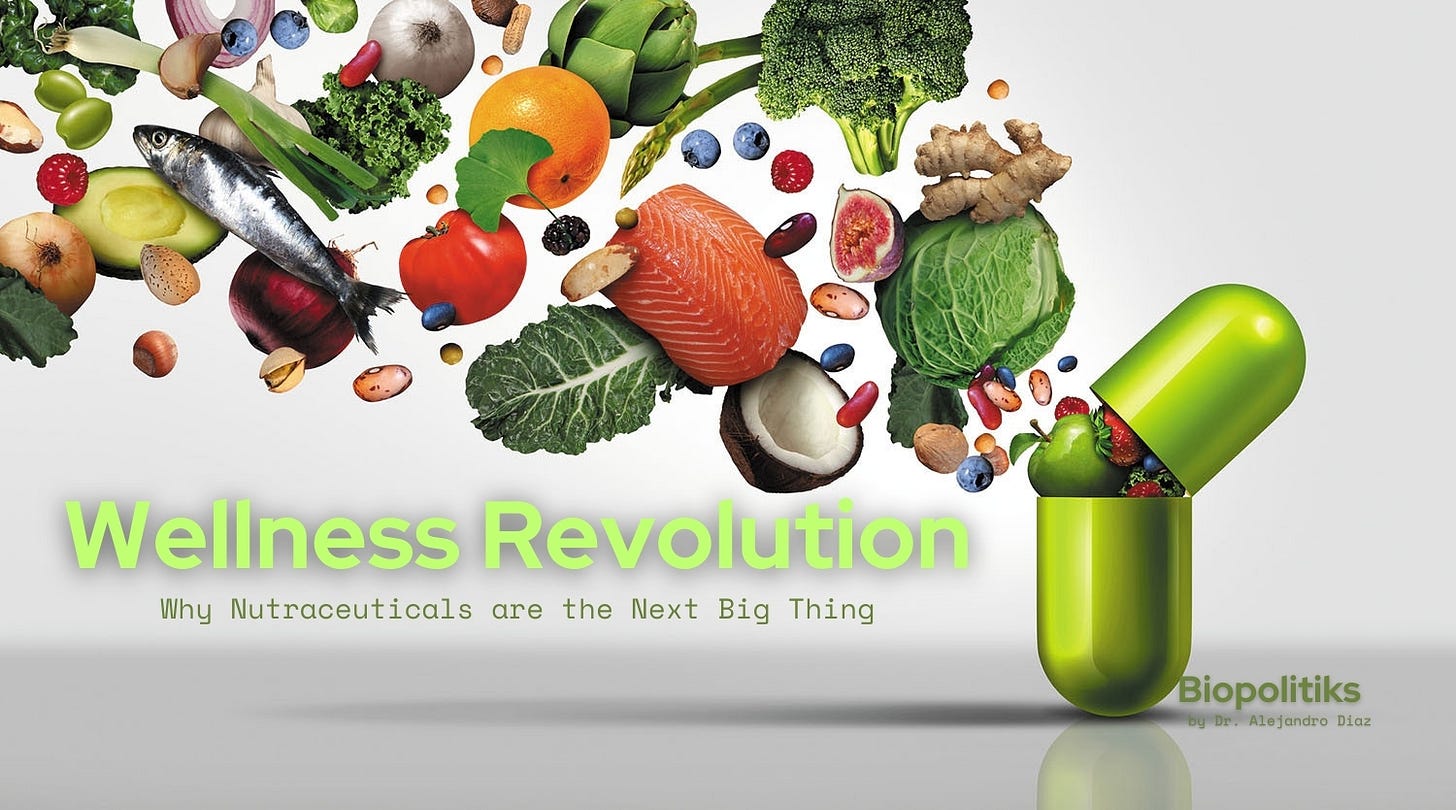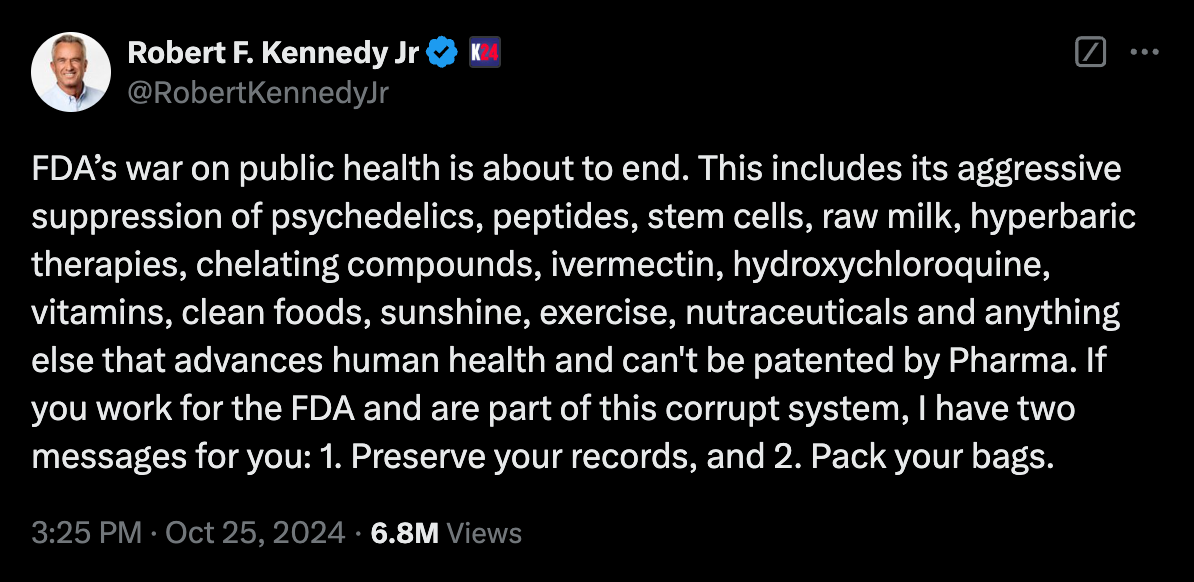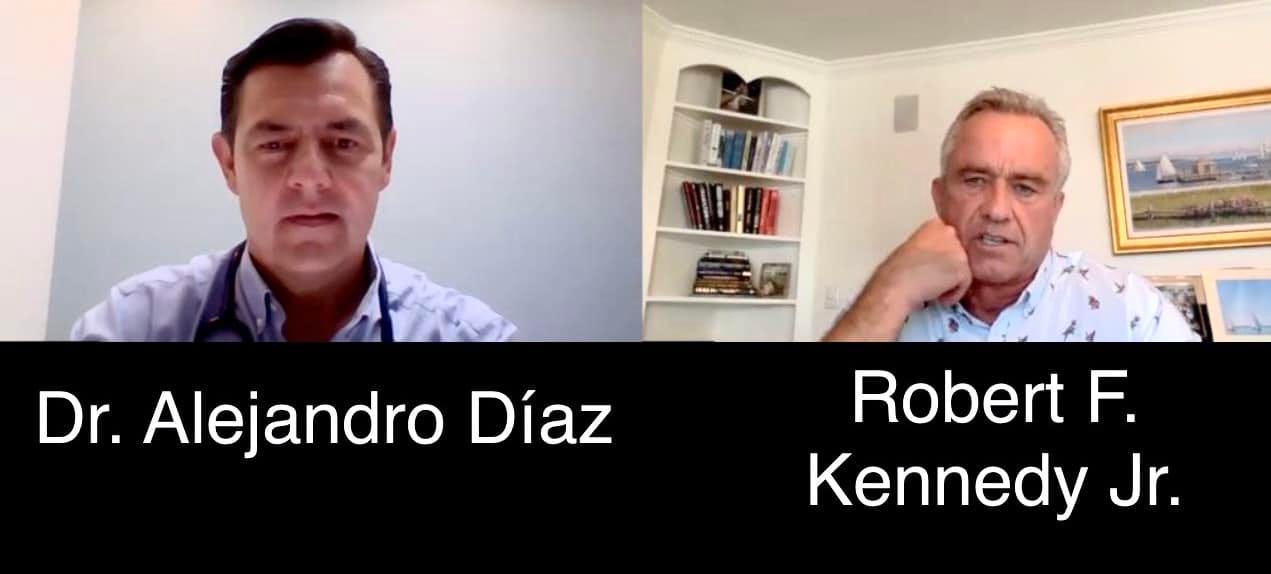Wellness Revolution
Why Nutraceuticals are the Next Big Thing
The New Health Conscious
The revival of health consciousness that has taken place in this decade has changed the way the general public views healthcare—forever. The COVID Operation put health back into the conversation. This elevation in the collective health consciousness has led to a Wellness Revolution, worldwide.
Patients now understand the reality of the state of healthcare systems. The fact is that we are a highly medicated and highly vaccinated society, and the truth is that as the use of these products has increased, so has disease prevalence.
If we take more vaccines and more medications than ever before as a society, shouldn’t we be healthier than ever? Unfortunately, this isn’t the case. The global population is sick and only getting sicker; the toxic injectable products, gene therapy, so-called “COVID Vaccines” made sure that people become permanent clients of the sick-care industrial complex.
A stellar example of this phenomenon is the United States. The United States makes up around 4% of the world’s population, yet it represents around 64 to 78 percent of global pharmaceutical profits. This should mean that Americans are the healthiest in the world by far, right? Unfortunately, no. The United States leads the world in chronic disease prevalence and has a significantly lower life expectancy than most other developed nations.
The current system is fraudulent. People are taking notice of this fraud. In protest, they are looking for alternatives to traditional medicines for disease care. One of the emerging therapeutics in this realm is nutraceuticals.
Nutraceuticals are foods or elements of food obtained from plant or animal origin with significant medical or health benefits utilized to prevent or cure diseases. The medicinal use of food or food elements derives from the beginning of modern medical understanding. Hippocrates is famous for his remarks on this issue. He states, “Let food be thy medicine and medicine be thy food.”
As an allopath (Pediatric Allergist/Immunologist), I increasingly shift towards this alternative line of thinking. I am not saying that all medications are bad, but I think we have to be far more selective in the way we use them.
Recently the term “nutraceuticals” has regained relevance. Once brushed off by the medical community as fringe “pseudoscience” with no demonstrated clinical benefits, is now being lauded at the highest levels of healthcare policy. In a controversial tweet, just before the U.S. Presidential Election, Robert F. Kennedy Jr. shared some details of his plans for public health in the United States.
I have repeatedly mentioned the significance of Robert F. Kennedy Jr.’s appointment to lead the Department of Health and Human Services. His appointment assures that the official narratives on alternative approaches will change from a tone of “aggressive suppression” as RFK describes it, to one of medical freedom. This will surely accelerate the effects of the wellness revolution.
The Wellness Revolution
This movement represents a change in the public's attitudes toward their health. This has materialized in several different ways. First, it is in the products that patients choose to consume. Pharma, for example, has taken advantage of this wellness attitude shift by introducing products such as GLP-1s, statins, and other drugs to remediate the effects of the chronic disease epidemic that they caused. Additionally, it’s very common to see these drugs cause side effects, forcing patients to take yet another pill to “alleviate” the adverse effects, resulting in a never-ending vicious cycle.
It all boils down to a social movement that emphasizes disease prevention and longevity. The medical device industry has seen an explosion of growth for these reasons. Particularly wearable medical devices such as health trackers. These functional health trends are transforming patient care.
Probably the most significant way that this wellness revolution is materializing is in terms of diet and nutrition. The dietary supplement and nutrition industry has seen an explosion in growth over the last couple of decades, and with growing demand due to distrust and disillusion with traditional pharma and medical systems, this growth is set to continue. But even in nutrition, we have to regulate how they treat the source with pesticides and fertilizers, etc.
The term “nutraceuticals” is relatively new but has gained rapid relevance in alternative medical spaces. Although the term encompasses a broad umbrella of elements, essentially it refers to natural food products or components found in food that can be utilized for medicinal purposes. This can include components such as prebiotics, probiotics, vitamins, fibers, etc.
This functional approach to health is what will take the medical profession into the future. At the end of the day, these methods are in the best interest of the patient.
The microbiome is another example. A new world of information that explains how bifidobacteria interact and regulate many bodily functions. Dr. Sabine Hazan, an expert in the field, has talked extensively about this issue in her book “Let’s Talk SH!T”, a must-read.
Functional foods and nutraceuticals will be the base of treatment in the foreseeable future. These compounds provide health benefits beyond basic nutrition and contain bioactive compounds that can affect the body in various ways. for example, reduce cholesterol levels and inflammation, including examples such as fermented foods like miso, kimchi, flax seeds, salmon, omega-3 fatty acids, and walnuts. While compounds such as probiotics promote gut microbiota balance, which is crucial for immunity and digestion.
The immense majority of diseases have one common denominator: Inflammation. Considering how functional foods and nutraceuticals have inflammation-reducing benefits, these products can have an extensive range of applications.
I would like to provide a couple of examples of bioactive compounds that have medicinal benefits. Turmeric and Curcumin, for example, have anti-inflammatory, and antioxidant benefits and may also contribute to remediating the effects of heart disease, Alzheimer's disease, and depression. Some even cite turmeric's potential to inhibit cancer progression.
What the shift to these products also represents is an emphasis on prevention. Increased clinical use of these types of natural products will promote a culture of disease prevention rather than disease management.
Robert F. Kennedy Jr. was asked in an interview recently with CNBC’s Jim Cramer about his thoughts on GLP-1s. RFK Jr. responded by saying “The first line of response should be lifestyle. It should be eating well—making sure you don’t get obese…”
This represents a fundamental shift in the line of thinking in those leading public health policy. I have never heard anyone in government speak that way.
The ideological change that is set to take place as the new administration takes power will surely flow downstream to medical standards of care, further exacerbating the growth in the market of natural remedies, including nutraceuticals.
I fully support this change. For too long, patients and even doctors have been attacked on all fronts, forcing them to cave to the status quo or face excommunication from the medical religion. If we are sincere, medicine is a religion. Dr. Robert Mendelsohn touches on this topic in his book “Confessions of a Medical Heretic”.
Physicians from all medical orthodoxies, whether they be allopathic, homeopathic, osteopathic, or naturopathic, should unite in consensus about the healing effects of these compounds and their applications in treating and managing disease.
A shift away from over-medication is necessary to reverse the effects of the chronic disease epidemic and the long-term promotion of optimal health.
Nutraceuticals: Bridging the Gap between Nutrition and Medicine. This emerging field has become a cornerstone in the shift towards preventive healthcare, where the focus is not only on treating illness but also on sustaining optimal health. A new awareness in the field of medicine is on the rise, as physicians, we have to be loyal to our Hippocratic oath “Primum non nocere”. In modern medicine, praxis physicians rarely ask the patient about the quality of their sleep, the basis of their diet, and the patient’s social environment.
I’m excited to see what the future holds for this momentous awakening.
FIN
Biopolitiks by Dr. Alejandro Diaz
About Me (Dr. Alejandro Diaz)
I am a Pediatric Allergist / Immunologist and Global Health Expert with extensive international experience. I have delivered conferences in over 27 countries around the globe on topics of medicine, migration, biosecurity, and related topics. This includes prestigious venues such as the White House, the US Capitol, the Romanian Parliament, the European Parliament in Brussels, the Mexican Senate of the Republic, the United Nations in Geneva, Japanese Parliament, among others.
My career encompasses diverse roles in healthcare including private practice, health systems, and advisory positions for medical service companies, governments, and government entities worldwide.






Great read and all so right on the money!
https://www.amazon.com/s?k=let%27s+talk+sh+t+-+the+book&crid=1GG96VF2W3SVL&sprefix=Let%27s+talk+sh%2Caps%2C143&ref=nb_sb_ss_ts-doa-p_1_13
The Sabine book link is denominated in a different currency. This link is for U.S. dollars.
While your diagnosis of America's healthcare paradox is astute - highest pharmaceutical profits yet poor health outcomes - your proposed solution of nutraceuticals merely substitutes one reductionist approach for another.
The fundamental flaw lies in our obsession with dissecting wholes into their smallest components. When you cite Hippocrates' famous "Let food be thy medicine" quote, you miss its original context. Hippocrates, unburdened by microscopes and modern technology, spoke of food holistically - its natural form, taste, and essence. He wasn't suggesting we reduce foods to isolated compounds and nutrients.
The body doesn't recognize our mental constructs of "fiber," "vitamin C," or "protein B." These are human categorizations, based on the blind identification with the mind as the sole arbiter of life, - useful for study perhaps, but far removed from how the body actually functions. This disconnect exemplifies our current predicament: highly intelligent people who've lost touch with the fundamental nature of being.
Here lies a subtle but critical trap: the very mindset of "eating healthy to prevent disease" creates an unconscious relationship with what we fear. When we orient our choices around preventing illness, we inadvertently maintain a constant relationship with the very thing we're trying to avoid.
If we're consuming specific foods to prevent high cholesterol or taking supplements to ward off potential ailments, we're actually engaged in an unconscious struggle with these conditions. This paired opposition can create a self-fulfilling prophecy - as our fears increase, our health may actually spiral downward.
What's more troubling is how our technological advancement has created an illusion of control. We mistake information accumulation for understanding, drowning in data points that overwhelm rather than illuminate. These endless metrics and measurements serve primarily as placebos, calming our anxious minds with a false sense of mastery over the unknowable.
True health isn't maintained through checklists, calorie counting, or supplement regimens. While these tools might have value, they're secondary to the body's innate intelligence and individual blueprint. It's about resonance with one's natural frequency, not adherence to universal protocols.
This brings us to a crucial point: there is no one-size-fits-all solution. Current policy approaches fail to recognize that what benefits one person may harm another. We've developed collective science seeking universal formulas while neglecting individual science - the understanding of differentiated needs based on blood type, body type, personality, and countless other factors. Yet this individualized approach remains largely undeveloped, with personalized testing often prohibitively expensive.
Which leads to the elephant in the room: how can we speak of a "wellness revolution" in a country without universal healthcare? It's paradoxical to discuss optimization through nutraceuticals when basic medical access remains a luxury for many. When an ambulance ride of 150 yards costs $1,500, we're not discussing freedom but systemic imprisonment. Even developing nations surpass America in providing basic healthcare access.
True revolution in wellness must begin with fundamental systemic change, not just exchanging one set of supplements for another. Until we address these core issues - our reductionist mindset, the need for individualized approaches, and basic healthcare access - any talk of a wellness revolution remains premature.